New Paragraph
What To Do If Your Dental Implant Falls Out - A Quick Resource
What To Do If Your Dental Implant Falls Out - A Quick Resource
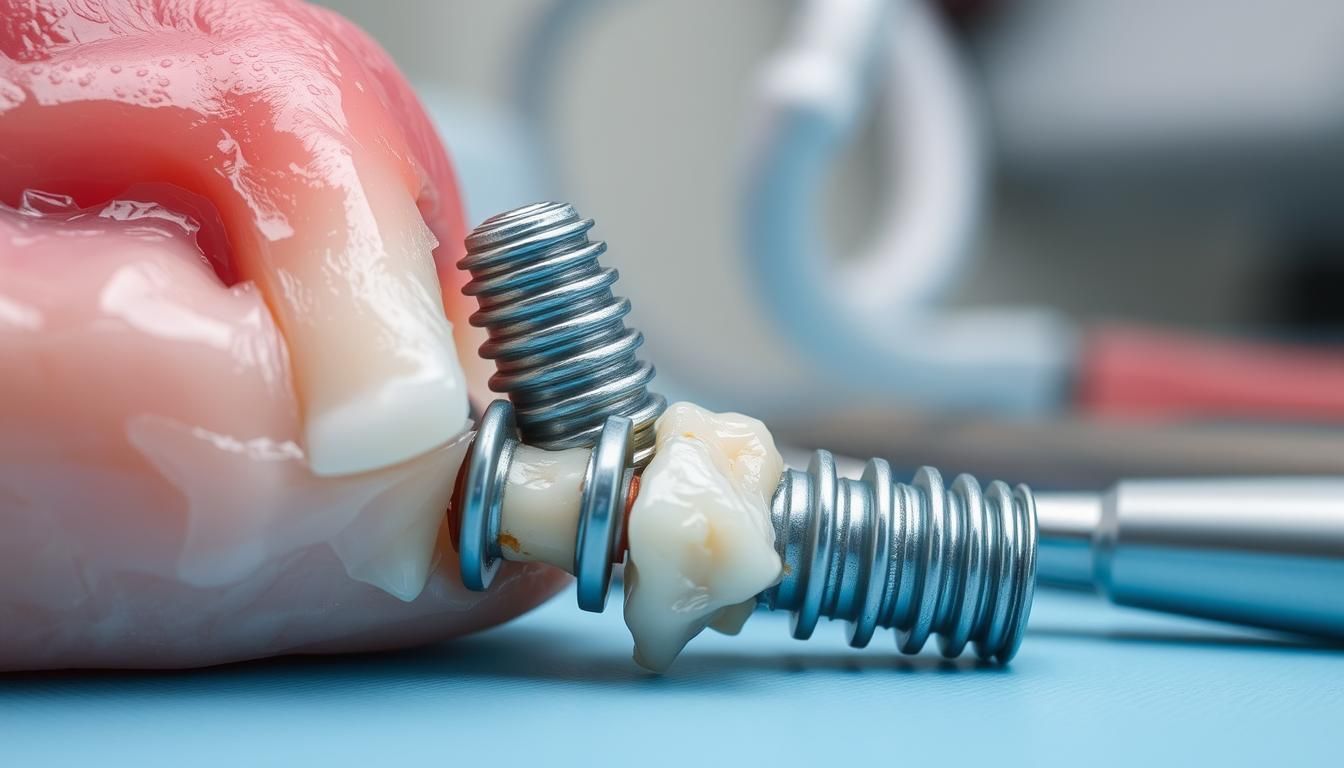
Dental implants are a common tooth replacement choice, with a success rate of 90-95%. But, even with such high success rates, implant failures can happen. If your implant is loose or has fallen out, acting fast is key. DC Implant & Cosmetic Dentistry in Washington, DC, is ready to help with any implant issues.
Getting implants involves oral surgery, which needs skill and experience. Though rare, problems can occur due to healing issues, trauma, or health conditions. Knowing the signs of implant failure and what to do can greatly help keep your mouth healthy.
If you see unusual symptoms or think your implant is failing, get help right away. DC Implant & Cosmetic Dentistry, at 4444 Connecticut Ave NW #106, Washington, DC 20008, is here for you. Call (202) 540-1911 to book an appointment and talk about your implant worries.
Key Takeaways
- Dental implants have a 90-95% success rate
- Quick action is essential if an implant becomes loose or falls out
- Implant failures can occur due to various factors
- Regular check-ups are key for implant health
- Professional care is needed for implant problems
- DC Implant & Cosmetic Dentistry offers expert implant care in Washington, DC
Introduction
Dental implants have changed the game for teeth restoration. They have a success rate of over 97% after a decade. This makes them a top choice for fixing missing teeth, greatly improving people's lives.
These implants do more than just look good. They help keep the jawbone healthy, keeping up to 90% of bone volume in the first years. This is much better than dentures, which can cause bone loss. Plus, implants help avoid problems in nearby teeth, making them great for periodontal treatment.
Even with their high success rate, dental implants can have issues. It's key to plan and do the procedure right to avoid problems like sinus issues or nerve damage. Studies show that good planning before surgery can lower the risk of complications. This shows how important careful preparation is for a successful implant.
This guide will give you important info on dental implant care and common problems. Knowing this can help you keep your implants in top shape. This way, you can enjoy the lasting benefits of this amazing teeth fixing method.
What Is a Dental Implant?
Dental implants are key in implant dentistry. They act as artificial roots for replacement teeth. Made of titanium, they bond with your jawbone, giving a lasting fix for missing teeth.
The Three Major Components of a Dental Implant
A dental implant has three main parts:
- The implant: A titanium post placed in the jawbone
- The abutment: A connector that links to the implant
- The crown: A custom-made tooth that looks and acts like a real one
Procedure for Getting a Dental Implant
The dental implant surgery process has several steps. First, the dentist inserts the implant into your jawbone. It takes 3 to 6 months for it to bond with the bone.
After healing, the abutment is attached. Then, the crown is placed, completing the implant.
Benefits of Dental Implants
Dental implants bring many benefits:
- Natural look and feel
- Improved speech and comfort
- Better oral health
- Long-lasting (95% success rate after 10 years for lower jaw implants)
- Helps prevent bone loss (up to 25% less than tooth extraction)
With 3 million Americans already having implants and 500,000 more each year, they're gaining popularity. The cost is $3,000 to $4,500 per implant. Yet, their durability and benefits make them a wise investment for the long run.
Common Reasons for Dental Implants Falling Out
Dental implants are a popular choice for dental restoration. But they can sometimes fail. Knowing why can help keep your smile looking great and prevent problems later.
Improper Healing
Osseointegration is key. It's when the implant bonds with the jawbone. But, about 5% of implants fail because of bad healing. Not enough bone support can make this process tough.
Poor Oral Hygiene
Not taking care of your mouth can cause peri-implantitis. This affects 10-20% of people with implants. It leads to bone loss and can make the implant fail.
Excessive Stress or Pressure
Grinding your teeth or eating hard foods can weaken implants. About 15% of implants loosen because of this. It's often because of too much stress on the implant.
Smoking and Tobacco Use
Smoking makes implants more likely to fail. It hinders healing and can cause problems. This lowers the success rate of dental implants.
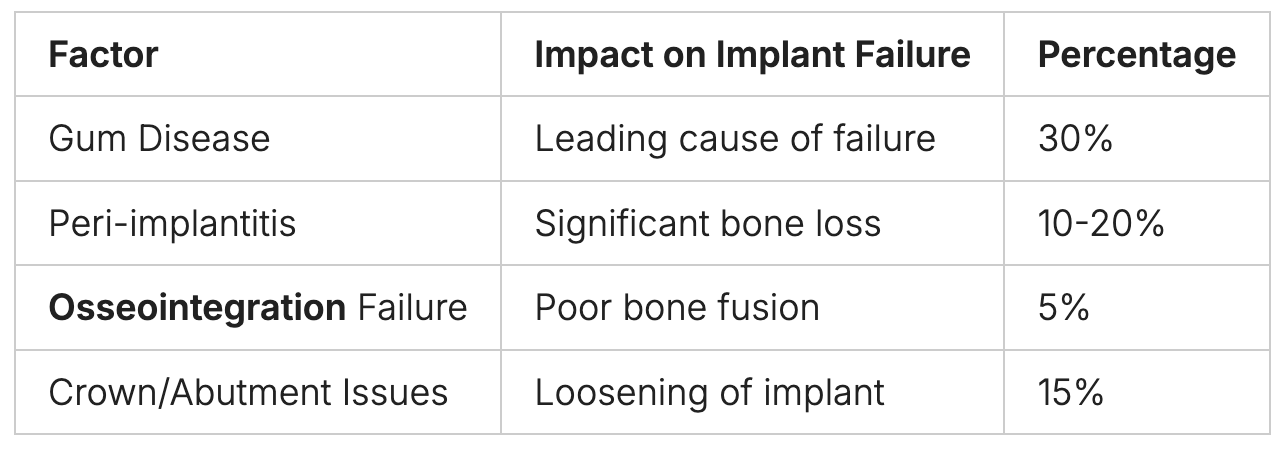
Despite these challenges, dental implants have a 95% success rate after 5 years with good care. It's important to follow post-op instructions. Patients who don't care for their implants are 2-3 times more likely to face problems.
How Could Your Dental Implant Fail?
Dental implants are a common choice for tooth replacement, with a success rate of 95 to 98 percent. But, failures can happen. Knowing why implants might fail is key to keeping your mouth healthy and avoiding problems.
Unusual Stress on the Implant
Too much force on your dental implant can cause it to fail. Grinding your teeth, misaligned teeth, or biting hard objects can put too much stress. This stress can make the implant loose or damage the bone around it, making it unstable.
Poor Jawbone Density and Mass
Having enough jawbone density is important for implants to work well. Conditions like osteoporosis can make the bone weak, raising the chance of implant failure. Sometimes, a bone graft is needed before surgery to make sure the bone is strong enough.
Weak Immune System
Having a strong immune system is key for healing after getting an implant. Diabetes, certain medicines, or other health problems can make it hard for your body to accept the implant.
Rare Biological Rejection
It's rare, but sometimes the body can reject a dental implant. This rejection can happen if you have an allergy or an immune reaction, even with good care and placement.
Going to regular dental check-ups and keeping your teeth clean is important to avoid implant failure. If you see signs like pain, swelling, or looseness, see your dentist right away. They can help fix any problems and make sure your implant lasts a long time.
Failure Can Occur with The Titanium Post
Dental implants are a popular choice for teeth restoration, but they can fail. The titanium post, a key part of dental prosthetics, can have issues. Let's look at the main reasons for titanium post failure in implants.
Osseointegration Failure
Osseointegration is when the implant fuses with the jawbone. This process can fail due to poor bone quality or quantity. Patients with conditions like osteoporosis may face higher risks. Early detection is key to prevent further complications.
Post-Surgical Complications
After implant surgery, complications can arise. These may include infection or improper healing. Surgical trauma can also lead to implant failure. Proper periodontal treatment and follow-up care are essential to minimize these risks.
Bacterial Infection
Peri-implantitis, a bacterial infection around the implant, affects 10-20% of patients. It can cause bone loss and implant failure. Good oral hygiene is key to prevent this condition.
Chronic Health Conditions
Certain health issues can impact implant success. Uncontrolled diabetes, for example, increases the risk of implant failure. Patients with chronic conditions need careful monitoring during the implant process.
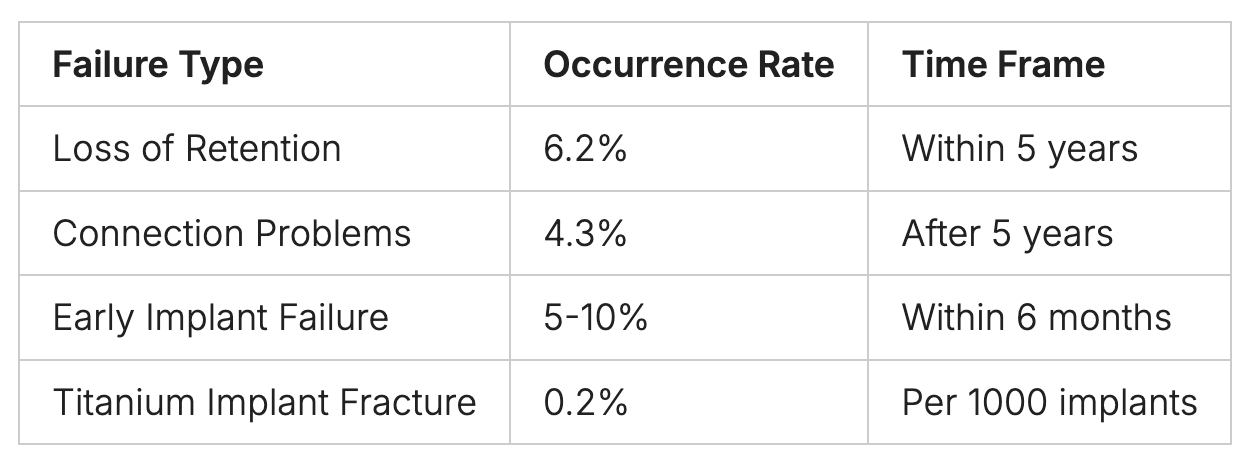
Understanding these factors can help patients and dentists work together for successful implant outcomes. Regular check-ups and proper care are vital for long-lasting dental implants.
Symptoms to Watch for If Your
Dental Implant Is Failing
Dental implants are a common choice for tooth replacement. They work well most of the time. But, knowing the signs of failure is important. Spotting these symptoms early can prevent bigger problems and keep your implant working well.
Pain and Swelling
Don't ignore pain or swelling around your implant. These could mean something's wrong. If you feel pain or swelling when you bite or chew, see your dentist right away.
Visible Bone Loss
Bone loss around your implant is a big worry. It can make your implant unstable. Regular dental visits can catch this problem early.
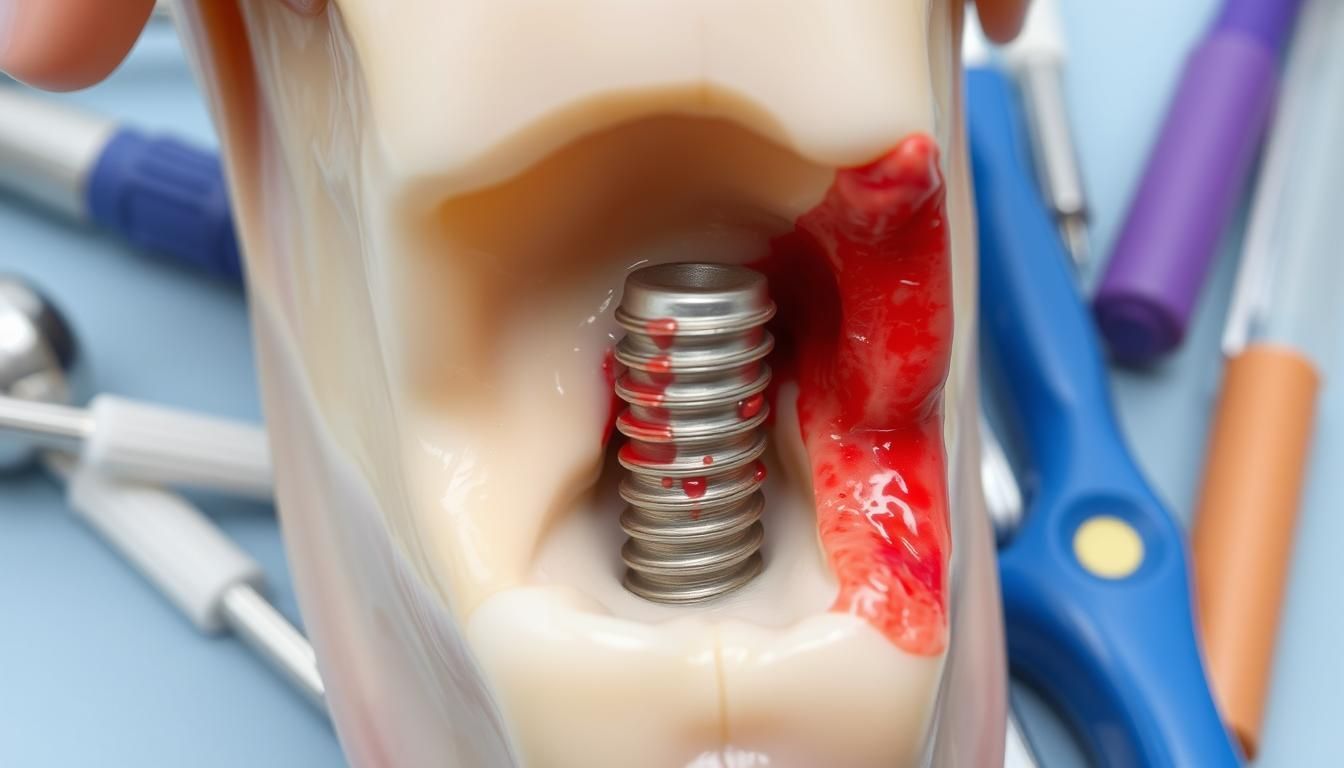
Bleeding at the Implant Site
Bleeding gums around your implant might mean you have an infection. This infection, called peri-implantitis, can harm your implant and bone. Don't ignore it.
Discoloration Around the Implant
Any color change around your implant is a warning sign. It could mean an infection or other problems. These issues can threaten your dental work.
Act fast if you see any of these signs. Getting help early is key. Regular dental check-ups and good oral care can help avoid implant failure. This ensures your tooth implants last a long time.
Immediate Steps to Take If Your
Dental Implant Falls Out
Dental implants falling out is rare, but it can happen. If this happens to you, knowing what to do is key for your dental health. It also helps with future dental restoration efforts.
Stay Calm and Assess the Situation
First, don't panic. Look at your mouth carefully. Check for signs of infection or bleeding. If you have severe pain or a lot of bleeding, get medical help right away.
Preserve the Implant Properly
If you find the fallen implant, handle it with care. Rinse it gently with water and put it in a clean container. Don't use harsh chemicals or scrub it, as this could damage it and affect osseointegration if you need to put it back in.
Contact Your Dentist Immediately
Call your dentist right away for an emergency appointment. Quick action can help save the implant and keep your dental aesthetics. Tell them about any pain or discomfort you're feeling.
Avoid Chewing on the Affected Side
While waiting for your dental appointment, don't chew on the side of the fallen implant. This helps prevent more problems and protects the implant site.
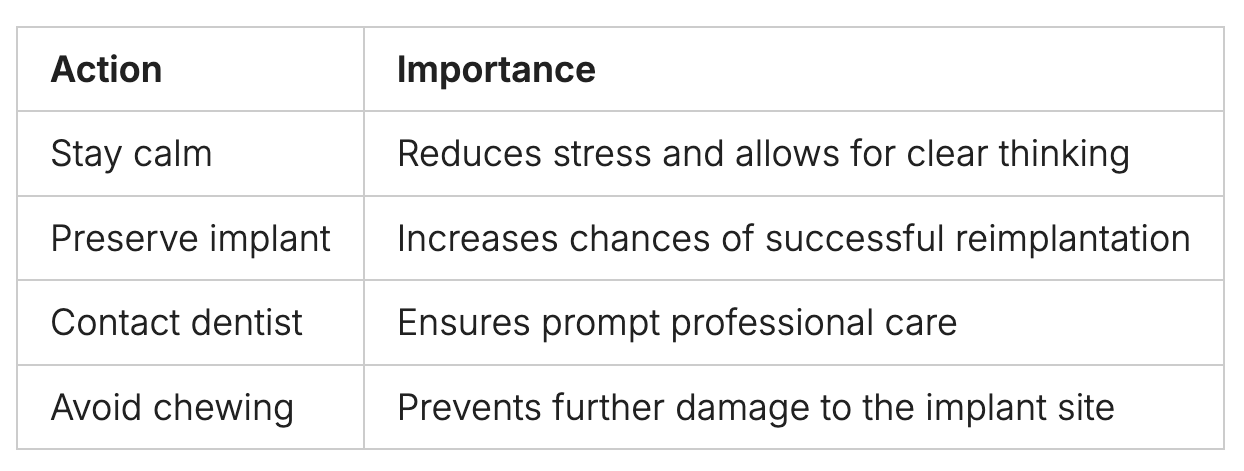
Remember, good oral hygiene is important to avoid implant problems. Brush twice a day, floss regularly, and go to regular dental checkups. This keeps your implants and overall oral health in good shape.
Risks of Not Fixing a Loose Dental Implant
Ignoring a loose dental implant can lead to serious consequences. Dental implants are meant to last a lifetime. But, problems can happen. Let's look at the risks of not treating a loose implant right away.
Implant Loss and Need for Replacement
A loose dental implant can fail completely if not treated. This might mean you need a tooth replacement procedure. This can be more complicated and expensive than fixing the problem early on. About 5-10% of dental implants fail each year, often due to bad placement or healing.
Infections and Inflammation
Loose implants can harbor bacteria, causing infections. These infections can spread, leading to inflammation and pain. About 1-3% of patients get post-implant infections, with smokers and diabetics at higher risk.
Risk of Sepsis
Untreated dental infections can turn into sepsis, a serious condition. Though rare, it shows why quick dental implant care is key. Infections may need antibiotics to avoid severe problems.
Impact on Surrounding Teeth and Gums
A loose implant can harm nearby teeth and gums. About 5-10% of cases see impacts on surrounding teeth during surgery. Not fixing a loose implant can lead to losing more teeth in about 20% of cases.
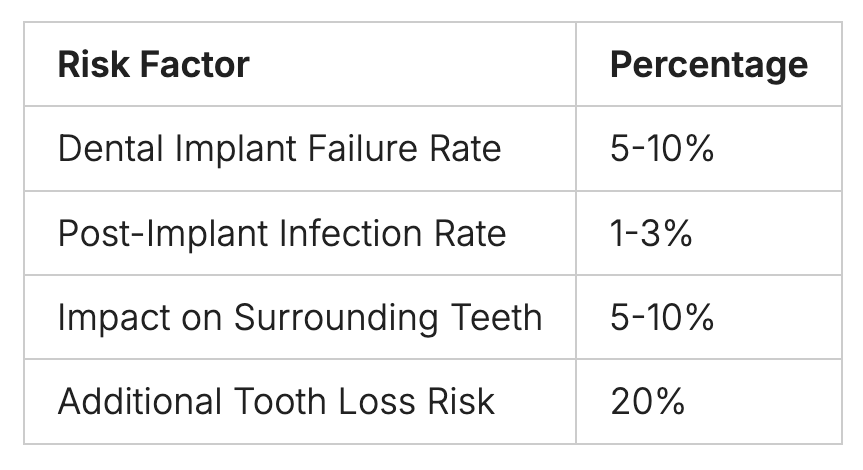
Regular dental check-ups and quick action for loose implants are vital. Early treatment can cut down complication risks by up to 75%. Don't ignore signs of a loose implant. See your dentist right away to keep your mouth healthy.
How to Care for Your Dental Implant
Proper care of dental implants is key to their long life and success. With the right care, these prosthetics can last forever. Here are some important tips to keep your implants in great shape.
Follow Your Dentist's Advice
Your dentist knows the best way to care for your implants. Always follow their post-op instructions. Regular check-ups, at least twice a year, are essential. This helps catch problems early and avoids costly treatments later.
Practice Good Oral Hygiene
Good oral hygiene is vital for your implants and natural teeth. Brush your teeth at least twice a day with a soft brush. Floss twice daily, focusing on the implant area. An antimicrobial mouth rinse can also help prevent infections.
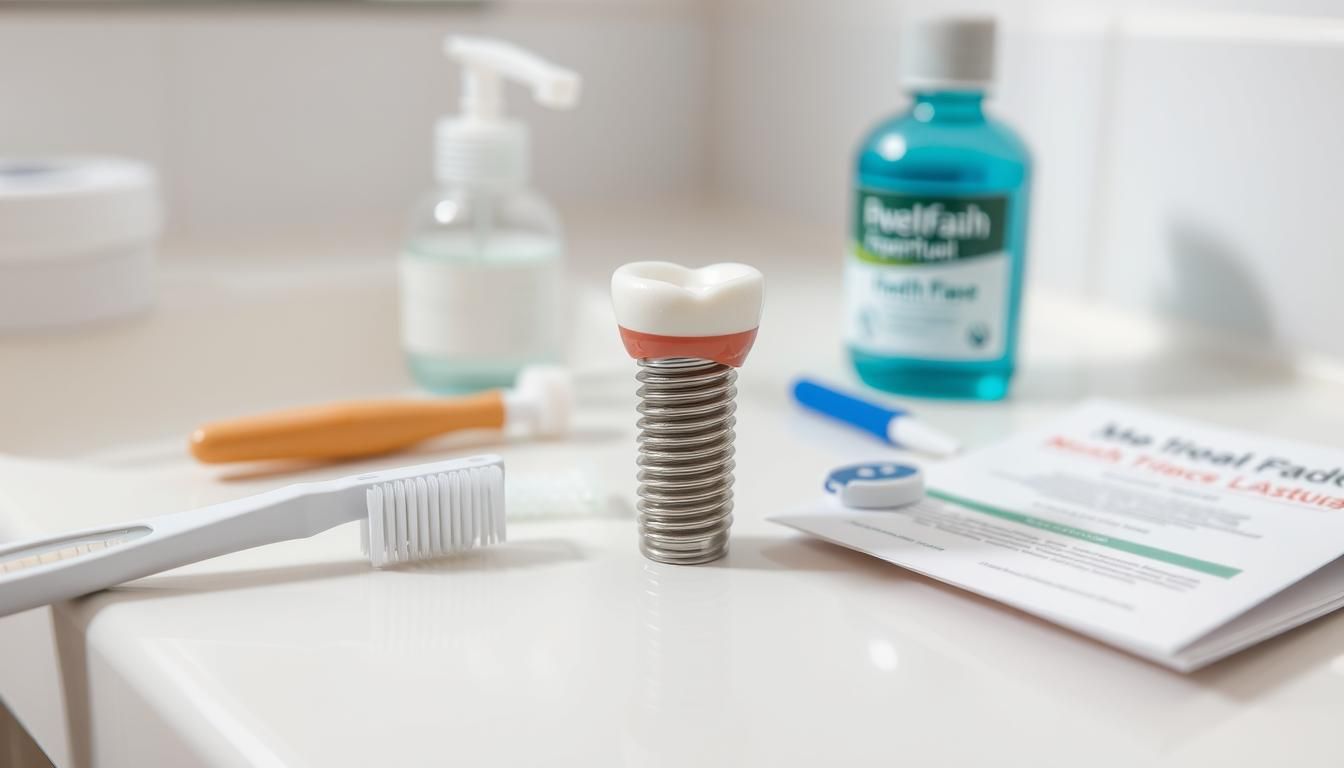
Avoid Hard and Sticky Foods
Watch what you eat to keep your implants strong. Avoid hard foods and sticky candies that can harm your implants or teeth. Eating a balanced diet helps keep your mouth healthy and supports your teeth.
Use of Protective Gear
If you grind your teeth, talk to your dentist about a night guard. This can protect your implants and natural teeth from wear.

Dental implants need ongoing care to last. By following these tips, you can ensure your implants last a long time and keep your mouth healthy.
Treatment Options If Your
Dental Implant Falls Out
If your dental implant fails, there are several options in implant dentistry. The right choice depends on why it failed and your oral health. Sometimes, dentists will replace the failed implant with a bigger one for more stability. This works well if your bone is in good shape.
But if there's a lot of bone loss, guided bone regeneration (GBR) might be needed. This method helps rebuild lost tissue before putting in a new implant. It's key for a strong base for the new implant.
- Removing the failed implant
- Rebuilding lost tissue
- Allowing the site to heal
- Placing a new implant
This approach takes longer but often leads to better results in the long run.
Dental implants have a high success rate, about 95% over 10 years. But, poor oral hygiene can cause problems. Studies show 20-40% of failures are due to bad oral care. Regular dental check-ups every 6-12 months can help keep your implants working well for a long time.
Conclusion
Dental implants are a top choice for replacing teeth, with a success rate of 95%. They not only fix dental problems but also boost how you feel about your smile. The healing time, called osseointegration, can take 3 to 6 months. This shows why it's key to be patient during this time.
Even with their many benefits, implants can have downsides. Around 15% of people might face issues like bleeding or infection after surgery. Going to the dentist every 6 months is important to keep your implants healthy and catch any problems early.
If you're thinking about getting implants, DC Implant & Cosmetic Dentistry can help. They're at 4444 Connecticut Ave NW #106, Washington, DC 20008. Call (202) 540-1911 to book a meeting and start your journey to a brighter smile.
DC Implant & Cosmetic Dentistry
4444 Connecticut Ave NW, #106
(202) 363-2810
FAQ
How long do dental implants typically last?
With proper care, dental implants can last a lifetime. But, the crown might need a replacement after 10-15 years due to wear and tear.
Can a fallen out implant be reused?
Usually, a fallen out implant can't be reused. A dentist must check the site to find out why it failed and what to do next.
How soon after an implant falls out should I see a dentist?
See your dentist right away if your implant falls out. Quick action helps avoid problems and boosts treatment success.
Are there any alternatives to dental implants?
Yes, options include dental bridges, partial dentures, and full dentures. But, implants are often the best choice because they last long and feel natural.
Can smoking affect the success of dental implants?
Yes, smoking can harm dental implants. It can slow healing, raise infection risks, and even cause failure. Quitting is advised for those with or considering implants.
How often should I have my dental implants checked?
Regular visits are key for dental implants. Dentists usually recommend check-ups every six months. Your dentist might suggest more visits based on your needs.
What is osseointegration and why is it important for dental implants?
Osseointegration is when the implant fuses with the jawbone. It's vital for the implant's stability and long life. Proper fusion ensures the implant can handle biting and chewing forces.
Can I get an implant if I have gum disease?
No, you need to treat gum disease first. Untreated disease can cause implant failure. Your dentist will check your health and treat any gum disease before implant surgery.
Is the dental implant procedure painful?
The procedure is done under local anesthesia, so you won't feel pain during surgery. Some discomfort and swelling are normal afterward. These can be managed with pain meds and following your dentist's instructions.
How long does it take to recover from dental implant surgery?
Recovery time varies, but most can resume normal activities in a day or two. Healing and osseointegration take several months. You'll need to follow specific care instructions during this time.



